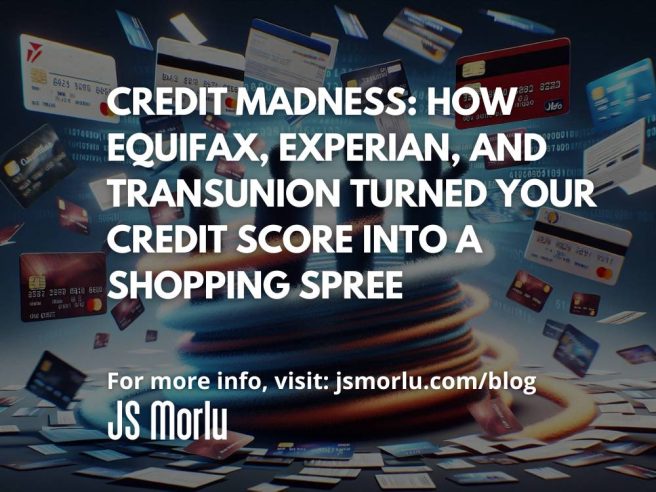By: John S. Morlu II, CPA
Welcome to the wild and wondrous world of credit reporting, where three shadowy giants – Equifax, Experian, and TransUnion – quietly wield more power over your life than you might realize. Once upon a time, these companies had a simple mission: keep track of whether you paid your bills on time and let the banks know if you were worthy of credit. But those days are long gone. Today, they’ve evolved from gatekeepers of financial trust into slick sales machines, peddling an endless array of financial products you didn’t ask for and probably don’t need.
This is no longer just about whether you can afford a mortgage or get approved for a car loan. These financial wizards have transformed your credit score into a marketing bonanza, using your data to sell you everything from shiny credit cards with promises of endless rewards to personal loans wrapped in colorful, irresistible packaging. And don’t think they’re alone. Credit Karma, Dun & Bradstreet, and a growing gang of data-driven profiteers have joined the credit carnival, each one eager to shove a fistful of high-interest offers into your inbox, as if they were hawking overpriced popcorn at a circus.
So buckle up! You’re about to embark on a hilarious and eye-opening journey through the twisted landscape of modern credit reporting, where you’ll discover how these companies have turned your personal data into gold, and how the system has morphed into a non-stop sales pitch with a side of debt. Ready to laugh, cry, and maybe rethink your next credit card application? Let’s dive in.
Chapter 1: The Holy Trinity of Credit Reporting
Our tale begins with Bob, the proud owner of Bob’s “Just Lamps,” a small but glowing (pun intended) business that specializes in selling every kind of lamp under the sun. From sleek desk lamps that scream “productivity” to floor lamps that could light up a stadium, Bob’s even got a few lava lamps for those still holding on to the dream of the 1970s. Business is good, and Bob, being the ambitious man that he is, has his sights set on expansion. Why stop at one store when you can conquer the neighboring towns with light and style?
But there’s a catch—expansion requires money, and money means getting a loan. And in today’s world, getting a loan means one thing: your credit score. That’s right, Bob’s dreams of lamp domination rest in the hands of three all-seeing, all-knowing entities that make up the Holy Trinity of Credit Reporting: Equifax, Experian, and TransUnion.
These companies have been quietly collecting data on Bob for years, compiling a detailed profile of his every financial move. Every time Bob paid his electric bill (even that one time he forgot because he was too busy testing out a glow-in-the-dark lamp concept), these guys were taking notes. Every swipe of his credit card at the local hardware store to buy new bulbs? They know. They probably even know how many light switches Bob’s installed in his house. Basically, they know more about Bob than Bob knows about himself.
Now, in a bygone era, these three credit gods would have done something simple, like send a plain, no-frills credit report to Bob’s bank. “Here’s your creditworthiness,” they would have said. But where’s the fun in that? We’re not living in the stone age anymore—no, these agencies have evolved into full-on marketing gurus. Instead of just passing judgment on Bob’s ability to get a loan, they’re here to spice things up with a sales pitch. Forget about simply getting approved or denied for a loan—Bob’s about to be offered a buffet of shiny, new financial products, and they come with all the bells and whistles.
First up, the zero-interest credit card offers. Sure, the interest might only be 0% for six months, but who’s counting? Equifax will make sure Bob’s mailbox is flooded with cards that offer cashback for everything, from his morning coffee to those custom lampshades he’s been eyeing. Who doesn’t want to get “paid” for spending money?
But wait, there’s more! Enter the personal loan for “emergencies” (because when the world’s in chaos, the last thing Bob wants to worry about is running out of filament bulbs). These loans are just a click away, and if Bob’s lamp store is ever in a tight spot, Experian’s got his back—at a modest interest rate, of course.
Oh, and let’s not forget the pièce de résistance: the “exclusive” financial advice services. For a small monthly fee, TransUnion will offer Bob personalized tips on how to manage his money and improve his credit score, as if they haven’t already spent years watching his every financial move. They’ll send him monthly updates, perhaps with a tip like, “Maybe pay that electric bill on time next month,” or “Have you thought about diversifying your lamps into ceiling fixtures?”
So here’s Bob, just trying to get a loan to expand his lamp empire, and instead, he’s bombarded by credit card offers, personal loans, and subscriptions to services he never knew existed. Equifax, Experian, and TransUnion are no longer content with being gatekeepers of financial health—they’re salespeople now, and they’ve got targets to hit.
But let’s be honest, who could blame them? After all, credit reporting is big business, and while Bob might just want a simple loan, these companies know that offering him everything under the financial sun is much more profitable. Why settle for just giving Bob a credit score when they can turn him into a lifelong subscriber of their many, many products?
And they’re not just targeting Bob. Nope, this financial fanfare is part of a broader trend. Credit Karma has joined the game, offering to show Bob his credit score for free (because, surprise, they’re selling his data to advertisers in the background). And then there’s Dun & Bradstreet, showing up with their own bag of tricks to convince Bob that his growing lamp empire needs business credit monitoring, even if Bob still isn’t entirely sure what that is. They all want a piece of Bob’s financial future—and if that future comes with an 18% APR, well, that’s just part of the game.
Bob might have started out thinking he was just applying for a loan, but now he’s standing in the middle of a financial circus. Equifax is the ringmaster, Experian is juggling credit card offers, and TransUnion’s got the high-wire act of financial advice, all while Bob just wants to keep the lights on—literally and metaphorically.
By the time the dust settles, Bob’s learned a valuable lesson: in the world of credit reporting, your financial health isn’t just something to be monitored—it’s something to be sold. And if that comes with a few credit card offers, personal loans, and subscription services along the way, well, at least Bob will have enough lamp-lit guidance to navigate his way through the dark corridors of modern-day credit marketing.
Will Bob expand his lamp empire? Will he avoid the temptations of zero-interest credit cards and “emergency” loans? Or will he find himself knee-deep in financial products he never asked for? Stay tuned, because in the world of credit reporting, the only thing certain is that there’s always more to sell.
Chapter 2: Equifax: The Data Breach Sorcerer
First up on our credit adventure is Equifax, the wise, ancient sorcerer of the credit reporting world—or at least that’s how they’d like to be perceived. In reality, Equifax is more like that bumbling wizard who accidentally sets his own robes on fire while trying to pull a rabbit out of a hat. If you need proof, just remember their grand magical mishap of 2017, when they somehow managed to leak the personal data of over 147 million people. No big deal, just the names, Social Security numbers, birth dates, and addresses of half the adult population of the U.S.!
But hey, who’s counting, right? It’s not like personal data is that important. And in true comeback fashion, Equifax has managed to recover from their colossal “Oops!” by focusing on what really matters: not fixing the past, but selling the future. Specifically, selling you financial products. You’ve gotta admire the hustle.
Take Bob, our friendly neighborhood lamp mogul. One fine morning, Bob receives a shiny new email from Equifax. The subject line grabs his attention: “Unlock the Secrets of Your Financial Future!” Secrets? Bob loves secrets—especially the kind that involve growing his lamp empire. So, like the brave financial explorer he is, he clicks.
The email promises to help Bob “take control” of his credit with Equifax’s Credit Monitoring™ services. For a small monthly fee (only the cost of a latte per week!), Equifax will let Bob know if anyone so much as sneezes in the direction of his credit report. They’ll monitor, alert, and maybe even send him a horoscope if he’s lucky. Bob, intrigued by the idea of unlocking anything—financial or otherwise—decides to give it a try. After all, what’s the harm in keeping an extra eye on his credit?
But as Bob digs deeper, he realizes he’s not just unlocking secrets. He’s opening Pandora’s inbox, and out comes a flood of credit card offers he didn’t ask for and personal loans he definitely doesn’t need. Equifax, like a crafty wizard with a credit wand, is waving enticing offers in front of Bob’s face: “Sign up for this 0% APR credit card and get double rewards on your lamp purchases!” or “Need cash fast? Here’s a personal loan—because you never know when your lava lamp might need a replacement!”
What Equifax conveniently forgets to mention is that this tidal wave of offers is no coincidence. Nope, this isn’t financial serendipity. These offers are handpicked for Bob, using the very data that Equifax has been quietly siphoning from him for years. That Credit Monitoring™ service Bob signed up for? Oh, it’s monitoring all right—monitoring his spending patterns, browsing history, and most importantly, his obsession with novelty lamps. It’s as if Equifax knows Bob’s every move before he does.
Picture it: Bob innocently buys a new desk lamp online. Moments later, Equifax’s magical marketing machine spins into action, sending out signals to credit card companies far and wide. “Alert! Alert! Bob just bought a lamp! Quick, hit him with an offer for the ‘Light Up Your Life Platinum Card’ with bonus rewards on all lighting purchases!” Bob’s financial DNA is now out there in the world, turning profits for Equifax, all while they’re whispering sweet nothings like, “We’re here to help you take control of your financial future.”
Bob’s inbox begins to resemble a medieval marketplace. “Step right up! Get your personal loans here!” “Looking for a card that matches your fluorescent lifestyle? We’ve got just the thing!” It’s as if Bob’s entire financial existence has been distilled into one eternal carnival, and Equifax is the ringleader, shouting over the crowd to ensure Bob doesn’t miss a single high-interest deal.
But the best part? Equifax doesn’t even need Bob to buy anything for them to profit. Oh no, the real money comes from selling Bob’s data to everyone else. Credit card companies, banks, lenders—they’re all lining up to buy access to Bob’s lamp-loving lifestyle. And it’s not just Bob. Every Bob, Jane, and Larry out there is unknowingly fueling this multi-billion-dollar industry, where the product isn’t the credit score—it’s you.
Equifax is like the Willy Wonka of credit, only instead of chocolate, they’ve got data, and instead of Oompa Loompas, they’ve got algorithms working around the clock to package and sell every scrap of financial information they can find. And if that means bombarding Bob with offers for credit protection he doesn’t need or loans with interest rates that could double his electric bill, well, that’s just the cost of doing business.
Of course, to Equifax, this is all part of the service. They’re not just a credit reporting agency anymore—they’re a financial concierge. Want to know your credit score? They’ll tell you—for free. Want to monitor your credit? They’ll do it, for a small fee. Want unsolicited financial advice that you probably didn’t ask for? Oh, you better believe they’ve got that in spades. Bob’s not just a customer; he’s a walking data stream, and Equifax is here to make sure that stream flows smoothly… straight into their bottom line.
As Bob stares at his inbox, filled to the brim with offers for new credit cards, personal loans, and services he never knew existed, he can’t help but chuckle. All he wanted was to expand his lamp business, but now he’s knee-deep in a world of financial wizardry, where his credit score isn’t just a number—it’s an opportunity for profit, for everyone but him.
Will Bob figure out how to navigate the treacherous waters of credit marketing? Or will he succumb to the shiny offers, lured in by the promise of cashback and low introductory rates? One thing’s for sure: in the world of Equifax, every financial decision is another chance to sell you something you didn’t know you needed. And that, dear reader, is where the real magic happens.
Chapter 3: Experian: The Credit Score Hustler
Next up in the unholy trinity of credit reporting agencies is Experian, the smooth-talking, slick-haired hustler of the financial world. If credit reporting were a game of poker, Experian would be the guy sitting across from Bob, wearing sunglasses indoors and casually dropping phrases like “All in.” Their unofficial tagline might as well be: “Why just report credit when you can sell it back to people?” It’s not just a service; it’s a lifestyle.
Experian has mastered the art of convincing people like Bob that their credit score is not just a number—it’s a reflection of their entire self-worth. And like any good hustler, Experian knows that Bob doesn’t just need to check his credit score now and then; Bob needs to obsess over it. He needs to live, breathe, and dream about it. Who cares about lamp sales when your credit score is a meager 704?
One afternoon, Bob, happily tending to his beloved lava lamps, receives a ping on his phone. It’s a text from Experian with an urgent message: “Your credit score just changed! Click here to see what’s new!”. Bob’s heart skips a beat. Changed? What does that mean? Did his credit score go up? Down? Did buying that extra floor lamp nudge him into a new financial tier?
Curiosity gets the better of him, and Bob clicks the link. He’s whisked away to Experian’s dazzling, color-coordinated dashboard—an array of charts, graphs, and interactive widgets that make it look like his financial health is the most exciting video game ever created. And then, before Bob can even process what’s happening, BOOM! A pop-up appears. “Want to boost your credit score? Try Experian Boost™!”
Now, Bob’s not quite sure what Experian Boost™ is, but the name alone promises him one thing: more credit score. Who wouldn’t want that? It’s like discovering a secret cheat code to level up in the game of life. The catch? All Bob has to do is link his utility and phone payments to his credit report, and voilà—he gets a few extra points added to his score. Instant gratification, just the way Bob likes it.
But here’s the rub: while Experian makes it sound like they’re doing Bob a huge favor—helping him by adding his phone bill payments to his credit score—what they’re really doing is siphoning even more data from Bob’s life. His electricity usage, his water consumption, even how often he splurges on high-speed internet—it all becomes part of the massive database Experian is building. Why? Because data is king. The more data they collect, the more valuable Bob becomes—not to himself, but to Experian’s real customers: banks, credit card companies, and anyone else willing to fork over cash for the privilege of pitching more financial products to Bob.
Of course, to Experian, Bob’s credit score isn’t just a number. It’s part of his personal brand. And in the credit score hustle, there’s always room for improvement. Bob’s 704 isn’t bad, but with just a few more tweaks—a linked phone bill here, a credit monitoring subscription there—he could easily bump it up to a more impressive 720. And who knows? Maybe with enough Boosts™, Bob could one day join the coveted ranks of the 800 Club, where financial angels sing and credit card approvals rain down from the heavens.
Experian, ever the savvy credit score guru, doesn’t just stop at Boost™. Oh no, they’ve got Bob on a full-blown financial self-help journey, and they’re his guide, his Sherpa, his personal coach through the rocky terrain of modern credit management. Want to check your score every day? Sure, but why stop there? How about credit monitoring alerts, where Bob gets real-time updates on every tiny fluctuation in his score? It’s like being stuck in a perpetual state of “refresh” on his credit dashboard, watching his score twitch and tremble like a nervous mouse.
Experian is all about the hustle. Bob is now checking his score every morning before his first cup of coffee, nervously eyeing his utility bill, and wondering if it’s time to refinance his lamp warehouse. He feels like a Wall Street day trader, but instead of watching stocks, he’s glued to his credit score.
But let’s face it: the real winner here is Experian. While Bob is deep in the trenches of boosting his credit, Experian is collecting, analyzing, and selling all of Bob’s precious financial data to whoever is willing to pay for it. Bob’s phone bills, his monthly Netflix subscriptions, his penchant for buying too many light bulbs in bulk—it’s all being packaged into neat little data parcels and sold off to banks, lenders, and credit card companies faster than Bob can say “APR.”
The beauty of it all is that Experian has convinced Bob that this is helping him. Bob feels like he’s in control, like he’s mastering the game of credit. But really, he’s just another cog in Experian’s well-oiled machine, grinding away to pump out more data and keep those marketing engines running.
By the time Bob realizes what’s happened, he’s already deep into the cycle. He’s Boosted™ his score five times, linked every conceivable bill to his report, and signed up for more financial products than he ever dreamed of. And yet, somehow, his score still isn’t perfect. There’s always a little room for improvement. After all, credit perfection is just a click away… for a small monthly fee.
In the end, Bob’s not just chasing a better credit score—he’s chasing an ideal, an elusive dream of financial superiority dangled in front of him by Experian’s algorithmic puppet masters. And as long as he keeps clicking, Experian keeps cashing in.
The moral of the story? In the land of credit scores, the house always wins.
Chapter 4: TransUnion: The Silent Stalker
In the wild world of credit reporting agencies, TransUnion is like the shadowy figure in the background—always there, always watching, but never making a fuss. They’re the strong, silent type, the credit agency equivalent of a mysterious, brooding character in a noir film, lurking in the alley with a trench coat and fedora. Except, instead of solving crimes, TransUnion’s mission is to quietly gather every shred of financial data about Bob while pretending to be his best pal.
One fine morning, Bob’s inbox pings with a message from TransUnion. The subject line? “We’ve Been Watching You (In a Totally Non-Creepy Way)!” Naturally, Bob’s a little unsettled, but curiosity wins out, so he clicks. After all, how bad could it be?
Inside the email, Bob is greeted with his latest credit report, as if it’s just another friendly update from a concerned neighbor. The report is neat, polished, and informative—like a well-crafted resume detailing Bob’s entire financial existence. But then things take a turn. Scattered throughout are “helpful suggestions”—offers for new business loans, a selection of cash-back credit cards, and, for some reason that baffles Bob, a detailed guide on how to start a side hustle selling artisanal dog treats. Bob doesn’t own a dog, but TransUnion is convinced that Bob, the guy with the lamp empire, is just one gluten-free bone away from becoming a canine snack tycoon.
And it’s not just the dog treats. The offers keep coming: low-interest personal loans for “business expansion,” travel rewards cards for that “luxury vacation” Bob never planned, and even a subscription to something called “Credit Zen”, where Bob can meditate on his financial karma for only $19.99 a month.
The thing is, TransUnion presents all this with a tone so nonchalant, it’s like they’re just suggesting it over coffee. There’s no hard sell, no pressure. Just a friendly nudge. “Hey Bob, we noticed you’ve been eyeing that small business loan. No big deal, but here are three options with low monthly payments. Also, we see you’re in the market for a side hustle. Ever thought about dog treats?”
It’s unsettlingly personal. Bob can’t shake the feeling that TransUnion knows more about his life than he does. How did they know he was thinking about expanding his lamp store? And why are they so insistent about this artisanal dog treat business? Bob feels like he’s starring in some credit-based reality show where every financial move he makes is being scrutinized and gently nudged in a particular direction.
But that’s TransUnion’s game—silent stalking with a smile. They don’t bombard Bob with flashy offers or credit alerts like Experian or Equifax. Instead, they sit back, gather data, and wait for the perfect moment to strike with the most eerily accurate recommendations. It’s like they’re always one step ahead, ready with an offer that makes Bob think, “Wow, maybe I do need that zero-interest business credit card!” when, in reality, he was just trying to pay off the one he already has.
TransUnion’s greatest strength is their subtlety. They don’t shout from the rooftops. No, they’re more like the friend who quietly remembers your favorite snack and shows up with it at the perfect time. Except in this case, the snack is a credit card with a 22% APR and a rewards program that’s probably more confusing than helpful.
And while they may seem laid-back, make no mistake—TransUnion is always watching. They’ve got eyes on Bob’s utility payments, his business expenses, even that one time he bought a lava lamp as a “business investment.” They know how much he owes on his business loan and how often he splurges on office supplies (which, for Bob, usually means novelty lightbulbs). They’ve quietly stitched together a complete profile of Bob’s financial habits and preferences, and they’ve packaged it all into a neatly personalized credit report that feels oddly intimate.
TransUnion’s email isn’t just a credit report—it’s a window into Bob’s soul. A soul that, apparently, could use some credit repair services and a few rewards points for future purchases. And though they assure Bob it’s all in his best interest, Bob can’t help but wonder if they’re really just here to sell him stuff he doesn’t need with money he doesn’t have.
In the end, Bob realizes that TransUnion isn’t just a silent observer. They’re more like that quiet friend who sits in the corner at parties, silently gathering intel on everyone in the room. They don’t speak up often, but when they do, it’s eerily accurate. They know your favorite drink, your go-to karaoke song, and—most importantly—exactly what kind of credit card you’ll sign up for after a few beers.
So while Equifax is out there flinging credit card offers like confetti, and Experian is busy convincing Bob he needs to boost his score every five minutes, TransUnion is calmly lurking in the background, biding their time, and waiting for Bob to make the next move—so they can offer him a pre-approved loan with just the right terms. And maybe a dog treat recipe on the side.
Chapter 5: Credit Karma: The Ultimate Enabler
Just when Bob thought he had a handle on the big credit bureaus, along comes Credit Karma, the plucky, enthusiastic newcomer in the financial game, promising to demystify credit scores and help people like Bob “take control” of their financial future. But here’s the twist: Credit Karma isn’t just a financial advisor—it’s a financial hype man, a cheerleader convincing Bob that more credit cards and loans are the answer to all his problems. It’s like a well-meaning friend who offers to help you move, but secretly just wants to borrow your truck… and your credit score.
Bob, being a fan of free stuff, logs onto Credit Karma one morning to check his score. After all, they’ve been telling him for weeks that he can get it at no cost, no strings attached. And who doesn’t love free? But the moment Bob hits the login button, he’s hit with an avalanche of “personalized” offers for credit cards, loans, and financial products. It’s as if he wandered into a Vegas casino where every machine has his name on it, flashing promises of “Big Rewards,” “Low APR,” and “Cashback Heaven!”
But Credit Karma doesn’t just toss these offers at Bob like confetti. Oh no, they offer them with a smile. The website is filled with friendly language, “helpful” avatars, and encouraging nudges, all designed to make Bob feel like he’s about to make the smartest financial decisions of his life. It’s like having a life coach, but instead of guiding you to enlightenment, they’re guiding you to a high-interest balance transfer offer with a slick “apply now” button.
“Hey Bob!” chirps a message from Credit Karma. “We’ve found the PERFECT credit card for you!” And it’s not just any credit card—it’s one with 0% APR for 12 months, a killer cashback program, and bonus points if he spends money on… lightbulbs? How did they know?
Bob’s curiosity gets the better of him. He clicks on the offer, half-expecting confetti to shoot out of his screen. Instead, he’s greeted by a pop-up window offering more details—“Act now!” it urges, in a tone that makes it sound like Bob’s financial future depends on this one card. The colorful graphics make it clear: this credit card isn’t just a financial tool, it’s a lifestyle upgrade. Why stop at lamps when you could be racking up airline miles, taking tropical vacations, and still buying lamps while you’re at it?
What Bob doesn’t realize is that while he’s thinking Credit Karma is here to help him “build his credit,” Credit Karma is quietly playing matchmaker between Bob and a steady stream of new debt. Behind the scenes, the banks and lenders are eagerly lining up to offer Bob shiny new ways to borrow money, all because Credit Karma has graciously shared Bob’s financial habits with them. It’s like Bob’s entire spending history has been auctioned off to the highest bidder, but with really cool graphics.
You see, Credit Karma isn’t just here to inform Bob about his credit score. They’re here to make sure Bob feels like he’s winning—even when he’s borrowing more money. It’s a classic hustle, but wrapped up in friendly emojis and colorful bar graphs. It’s like being sold a “buy one, get one free” deal on credit cards, only to realize you’ve just signed up for double the debt. Genius, really.
And the best part? Bob thinks he’s in control. Every time he checks his score or opens another offer, Credit Karma congratulates him like he just won a financial marathon. “Way to go, Bob! You’re building your future!” Except that future looks an awful lot like a credit card bill with multiple pages.
It’s the ultimate sleight of hand. While Bob thinks he’s using Credit Karma to “monitor” his credit, Credit Karma is actually monitoring Bob, nudging him down the path to financial dependence. And why not? Each time Bob signs up for a new credit card, loan, or service, Credit Karma gets a little thank you from the lender—a sort of finder’s fee for guiding Bob into their loving (and interest-charging) arms.
It’s like being sold the key to your own house, except this key comes with an annual fee and a variable interest rate. But, hey, it’s got great perks if you use it wisely!
Before Bob knows it, he’s deep in the Credit Karma ecosystem. He’s checking his score daily, getting alerts about new offers, and receiving virtual high-fives for every step he takes on his “credit-building journey.” Credit Karma has turned financial responsibility into a game—and Bob, like many others, is hooked. What was once just a tool to check his score for free has become an all-you-can-eat buffet of loans and credit cards, each one promising to make his life just a little bit brighter.
But here’s the kicker: as Bob happily clicks through another credit card offer, he doesn’t see the irony. Credit Karma, the very company promising to help him take control of his financial future, is really just helping him give away control—one credit card at a time. And all the while, they’re cheering him on with smiley faces, confetti, and pop-ups that make him feel like a financial wizard.
It’s like getting a gold star in school… except this one comes with a 22.99% APR and a friendly reminder that you can always apply for one more card. Just in case.
Chapter 6: Dun & Bradstreet: The Business Credit Whisperer
Over in the world of business credit, where the stakes are higher and the terminology more cryptic, Dun & Bradstreet reigns supreme. They don’t mess around with flashy emails or push notifications like the consumer credit guys. Oh no, Dun & Bradstreet likes to keep things classy and old school. They still send out letters—yes, actual physical letters. Because nothing says “we mean business” like paper.
One morning, Bob is sifting through his mail, expecting the usual collection of bills, pizza coupons, and newsletters from his local lamp-enthusiast society. But there it is: a crisp, official-looking envelope with the words “Important Business Credit Information Enclosed.” It’s from Dun & Bradstreet, and just seeing that name makes Bob’s palms sweat a little.
He opens the letter, and the alarm bells start ringing immediately. Words like “critical,” “urgent,” and “IMMEDIATE ACTION REQUIRED” leap off the page. Bob’s business credit score—his financial reputation in the big leagues—is apparently in serious jeopardy. According to Dun & Bradstreet, if he doesn’t act soon, his business could implode. Suppliers will stop trusting him, creditors will slam their doors in his face, and worst of all, his artisan lamp empire could flicker out before it even hits its stride.
Naturally, Bob panics. His mind races with scenarios of unpaid invoices, angry suppliers, and possibly having to sell his entire collection of lava lamps just to stay afloat. But fear not! Dun & Bradstreet offers a solution. All Bob has to do is sign up for their business credit monitoring service—for a reasonable monthly fee, of course. With this service, Bob will receive instant alerts anytime something changes with his business credit score. Because who doesn’t want to wake up at 2 a.m. to an alert saying their “lampshade supplier checked your credit report”?
The website is a maze of charts, reports, and “business intelligence solutions.” Bob, who’s still figuring out his personal credit, now has to navigate the complex world of business credit scores. It’s like trying to solve a Rubik’s cube while juggling—one wrong move, and everything collapses.
Dun & Bradstreet, with the slick confidence of a credit whisperer, lures Bob in further. They whisper sweet promises of peace of mind, financial foresight, and “getting ahead of the competition.” All Bob has to do is click “enroll” and, for a small monthly fee, his business credit will be watched over like a financial guardian angel.
But here’s where things get interesting. While Bob thinks he’s “securing his business’s future,” what Dun & Bradstreet is really doing is ensuring they can sell Bob’s business credit data to the highest bidder. That’s right. Bob’s business credit report, filled with all the juicy details about his payment history, credit limits, and even whether or not he bought those expensive lamps on layaway, is available for purchase.
Lenders, suppliers, and even competitors can all access Bob’s credit information—if they’re willing to pay. It’s like Bob’s financial life is on display at a silent auction, and Dun & Bradstreet is standing at the podium, hammer in hand, calling out, “Do I hear $100 for a peek into Bob’s latest loan application?”
Of course, Dun & Bradstreet doesn’t tell Bob this outright. They prefer to maintain the air of a trusted business advisor, sending him reports with titles like “Business Insights™” and “Credit Risk Solutions™”—all while quietly turning his financial profile into a marketplace.
But the true genius of Dun & Bradstreet? They’ve convinced Bob that he needs them. Bob doesn’t realize that they’ve been collecting and selling his business’s credit data for years. Every time he pays an invoice, applies for credit, or negotiates with a supplier, that information goes straight into Dun & Bradstreet’s magical data vault. And then, poof! It’s packaged up, slapped with a price tag, and sold to anyone interested in Bob’s business dealings.
It’s like Dun & Bradstreet is the ultimate business credit influencer. While Bob is busy fretting over his credit score, they’re busy selling his business credit report like the latest must-have item on the stock market.
But they don’t just stop at selling Bob’s credit data. Oh no. Dun & Bradstreet loves to keep him on edge with a constant stream of alerts, notifications, and gentle nudges reminding him that his business credit score could drop at any moment. It’s a brilliant cycle of anxiety and subscription fees. Every month, Bob gets a reminder that his business credit is being monitored, and every month, he’s assured that only by staying enrolled in Dun & Bradstreet’s credit services can he sleep soundly at night.
Bob may not realize it, but he’s now a full-fledged member of the Dun & Bradstreet ecosystem. His business credit score, once just a vague number, has become a central focus of his entrepreneurial life. And Dun & Bradstreet, the quiet, calculating whisperer of business credit, has once again turned data into dollars—Bob’s dollars.
So while Bob thinks he’s safeguarding his lamp empire, what he’s really doing is handing over the keys to his financial data to the credit-reporting puppet masters. And Dun & Bradstreet? They’re just sitting back, quietly whispering to the next business owner, “We’ve been watching you too… and we can help.”
Chapter 7: The End of the Road: A Credit Reality Check
By the end of our saga, Bob has not only been bombarded with offers for credit cards, personal loans, and business credit monitoring services—he’s drowning in them. His inbox, once reserved for important business emails and the occasional newsletter from his favorite lamp-making forum, is now overflowing with messages from Equifax, Experian, TransUnion, Credit Karma, and good ol’ Dun & Bradstreet. Each of them is offering to help him “take control” of his financial destiny, while subtly guiding him into buying more products he never asked for—and definitely doesn’t need.
It’s like the credit agencies have formed their own little tag-team of temptation, each one taking turns to whisper in Bob’s ear. “How about a new credit card with a low introductory APR?” “Hey, Bob, that lamp empire of yours could really use some extra financing with this unbeatable loan rate.” They don’t want Bob to just use credit—they want him to be obsessed with it. It’s no longer about whether he can repay loans; it’s about how much financial marketing they can cram into his life before he caves.
But here’s the twist: credit matters. No matter how exhausting the flood of offers and alerts gets, your credit score still plays a critical role in your financial life—whether you’re Bob the lamp mogul or just someone trying to qualify for an SBA loan to start a coffee shop. Your credit score can make or break your dreams. It determines if you can get that much-needed business loan, if you qualify for a mortgage, or if you can even sign up for a decent cellphone plan without needing a cosigner. It’s the invisible key that unlocks (or slams shut) the doors of opportunity.
Take Bob’s situation: Sure, he’s got five glowing credit cards now, and he might be struggling to pay them off, but without a decent business credit score, Bob wouldn’t even be in the running for the Small Business Administration (SBA) loan he needs to expand his lamp business to intergalactic heights. The SBA doesn’t care if Bob’s lamps are handcrafted with artisanal lightbulbs; they care about whether he’s a reliable borrower. And the way they figure that out? His credit score.
Here’s the kicker: while it feels like the credit system is designed to pull you into a whirlwind of offers, keeping a great credit score is non-negotiable. Whether you’re looking to secure a small business loan or just want to avoid paying ridiculous interest rates on a car loan, your credit score is your golden ticket. Yes, the credit agencies might seem like financial carnival barkers trying to lure you into their latest attraction, but behind the scenes, your score still carries a massive weight.
Why does it matter so much?
For starters, SBA loans, the holy grail for entrepreneurs like Bob, have credit score requirements that are no joke. Without a solid score, you can forget about getting approved. Lenders want to know that you’re not a financial liability, and the easiest way for them to make that judgment is by peeking at your credit score. A poor credit score can mean the difference between expanding your business or watching your dreams flicker out like one of Bob’s defective lamps.
But it’s not just about loans. That score impacts your interest rates, insurance premiums, and even rental agreements. It’s like the secret handshake that lets you into the exclusive club of “financially responsible adults.” And as annoying as the system can be, it’s one you don’t want to be on the wrong side of.
So, what’s the moral of this whole credit carnival?
Credit reporting agencies aren’t just passive record-keepers sitting in the shadows, silently tallying your debts and repayments. They’re active players in a game where your credit score is the ultimate currency. The more they can keep you focused on boosting, improving, and optimizing that magical number, the more opportunities they have to sell you products that claim to “help” but ultimately just line their pockets. Every time you get an email offering you the perfect credit card or a great rate on a loan, remember this: It’s not just about helping you; it’s about helping them.
And what about Bob? Well, his lamps might be glowing a little less brightly, now that he’s juggling five credit cards and dodging interest fees like it’s an Olympic sport. But hey, at least he’s got some free tote bags from all those sign-up bonuses. And let’s not forget the credit education webinars he’s now attending, because nothing screams “financial independence” like logging into a Zoom session about “how to use your credit card rewards responsibly.”
The Bottom Line
In the end, the modern credit system has become less about your ability to repay loans and more about how much financial product marketing can be thrown your way before you finally give in. But no matter how frustrating the process is, the reality is this: keeping a great credit score is essential. Whether you’re trying to get that SBA loan to fuel your dream business or just hoping to avoid the outrageous interest rates on a personal loan, your credit score is king.
So while the credit agencies might be playing their game, it’s still up to you to make sure your score stays in tip-top shape. And for Bob, that means being smart about his spending, keeping an eye on those credit card balances, and making sure he’s not just falling for every offer that promises to “boost his score.”
After all, Bob’s lamp empire might shine bright, but without good credit, he could find himself in the dark—literally and financially.
Author: John S. Morlu II, CPA is the CEO and Chief Strategist of JS Morlu, leads a globally recognized public accounting and management consultancy firm. Under his visionary leadership, JS Morlu has become a pioneer in developing cutting-edge technologies across B2B, B2C, P2P, and B2G verticals. The firm’s groundbreaking innovations include AI-powered reconciliation software (ReckSoft.com) and advanced cloud accounting solutions (FinovatePro.com), setting new industry standards for efficiency, accuracy, and technological excellence.
JS Morlu LLC is a top-tier accounting firm based in Woodbridge, Virginia, with a team of highly experienced and qualified CPAs and business advisors. We are dedicated to providing comprehensive accounting, tax, and business advisory services to clients throughout the Washington, D.C. Metro Area and the surrounding regions. With over a decade of experience, we have cultivated a deep understanding of our clients’ needs and aspirations. We recognize that our clients seek more than just value-added accounting services; they seek a trusted partner who can guide them towards achieving their business goals and personal financial well-being.
Talk to us || What our clients says about us









